Reading view
万科据报寻求第二支境内债券展期一年
中国房企万科寻求将本月到期的第二支境内债券展期一年,并向债权人提供关于推迟支付的计划详情。
彭博社引述知情人士报道,万科已告知部分债券持有人,公司正寻求将本月28日到期的37亿元人民币(6.74亿新元)债券的本金和利息支付期限延长12个月。3%的票面利率在延长期将保持不变。
万科正努力争取足够的债权人支持关于推迟偿还另一笔20亿元人民币债券的计划,这笔债券将在12月15日到期。
确保能展期在增强万科流动性、降低违约风险方面扮演至关重要的角色。涉及20亿元人民币债券的展期计划,再度引发人们对陷入困境的中国房地产行业的担忧,导致万科部分债券大跌至历史最低点。万科目前总计有约510亿美元(658亿新元)的有息负债。
最新的延期计划也引发人们对万科处理即将到期债务的策略产生质疑。
韩国瑜婉拒茶叙邀请 赖清德:韩有难言之隐
台湾朝野对立升温,总统赖清德原订下周邀请立法院长韩国瑜进行政务茶叙,但被韩国瑜婉拒。赖清德回应时称,韩国瑜有难言之隐,希望韩国瑜再思考。
综合台湾《联合报》和中央广播电台报道,总统府星期五(12月12日)晚间说,因应当前包括财划法、反年改等多项修法对于宪政民主与财政健全的挑战,并促进行政、立法等部门对话,赖清德预定下星期一(15日)上午邀请行政院、立法院及考试院院长在总统府进行茶叙,但韩国瑜已表达不出席。
对于韩国瑜将缺席,赖清德星期六(13日)回应时说:“我当然希望韩院长能够参与,因为国家的重大议题我们当然欢迎除了行政院,还有其他的院际以外,当然我们也希望立法院能够参加,所以我们希望韩院长能够再考虑一下,我们知道韩院长也有难言之隐,不过请他再思考一下。 ”
赖清德也说,年金议题牵涉到世代正义,也牵涉到台湾财政永续;反年改的法案还没有送出立法院,希望朝野都能够再三思考。台湾立法院在蓝白占人数优势下,星期五三读停砍公教人员年金的法案。
律师体检10年未查出癌症 官方回应未发现体检机构造假
北京律师张晓玲投诉,自己在爱康国宾体检10年未检出患癌风险,2024年被发现患癌时已是晚期,她质疑爱康国宾体检涉嫌“误检、漏检”。官方回应未发现造假,将进行医疗事故技术鉴定。
据《广州日报》、红星新闻报道,今年7月,北京律师张晓玲投诉称,她在爱康国宾健康体检管理集团有限公司设于北京的体检分院连续体检10年未被检出患癌风险,2024年被发现患癌时已是晚期,她质疑爱康国宾体检涉嫌“误检、漏检”。今年7月,张晓玲向北京市卫健委投诉了相关单位和人员。
张晓玲星期六(12月13日)对媒体表示,近日北京市卫健委对她投诉有了初步的处理结果。北京市卫生健康委在答复中表示,未发现涉事实验室数据及体检结果造假,但爱康国宾一门诊部因医废暂存间不符合卫生要求被警告并罚款2000元(364.5新元)。
同时,鉴于张晓玲对部分处理意见提出异议,经与张晓玲协商,北京卫健委下一步拟组织推进对她投诉的西内门诊部、西三旗门诊部、北京大学第一医院、北京大学国际医院有关问题的医疗事故技术鉴定相关事宜,根据鉴定结果组织督促依法依规进行处理。
战火重燃!泰国宣布继续军事行动,特朗普调停落空 - RFI - 法国国际广播电台

法新社武里南(泰国)消息,泰国政府周六(12 月 13 日)宣布将继续对柬埔寨采取军事行动,尽管美国总统特朗普曾保证这两个东南亚邻国已同意停火。
泰国总理阿努廷(Anutin Charnvirakul)在 Facebook 上表示:“泰国将继续采取军事行动,直到我们认为我们的领土和人民不再受到威胁。”
他补充说:“我们今天早上的行动已经说明了一切。”泰国军方证实,在格林尼治时间周五 22 点 50 分(当地时间 05 点 50 分),对柬埔寨目标进行了“还击”。一位军方发言人称,泰国空军“成功摧毁”了柬埔寨境内的两座桥梁,他声称这些桥梁被用于向战场运送武器。
空军发言人查克里特·塔马维猜(Chakkrit Thammavichai)保证,泰国飞机“正在使用高精度武器,以防止对无辜平民造成伤害”。
双方的指控与伤亡
柬埔寨国防部则在 X 平台上坚称,“泰国武装部队使用了两架 F-16 战斗机投掷了七枚炸弹”,针对多个目标。信息部长内斯·佩阿克特拉(Neth Pheaktra)表示,泰国“已扩大攻击范围,将民用基础设施和柬埔寨平民也包括在内”。
本周,这两个东盟成员国之间的冲突是继 7 月份的第一轮暴力事件之后的又一波冲突,已造成至少 20 人死亡,并迫使长约 800 公里的边境两侧数十万人逃离家园。两国都互相指责是对方挑起了这场危机。
特朗普的调解与停火的破裂
宣布继续敌对行动的几个小时前,美国总统特朗普曾保证,这对争夺领土数十年的邻国——曼谷和金边——已同意放下武器。
特朗普于周五晚上在他的“Truth Social”平台上写道:“今天早上,我与泰国总理阿努廷·查恩维拉库尔和柬埔寨总理洪马内(Hun Manet)就他们长期战争令人遗憾的死灰复燃进行了愉快的对话。他们同意今晚停止所有射击,并回到在我、他们以及伟大的马来西亚总理安瓦尔·易卜拉欣(Anwar Ibrahim)的帮助下达成的最初和平协议。”
特朗普补充说:“两国都已为和平以及与美利坚合众国的持续贸易做好了准备。”
在此前,泰国总理在与特朗普通话后曾表示,需要“向全世界宣布柬埔寨将遵守停火协议”。
“和平方式”
泰国总理安努廷补充说:“违反协议的人必须解决局面,而不是遭受后果的人。” 他于周五解散了泰国议会,为 2026 年初的选举铺平了道路。
柬埔寨总理洪马内也在周六通过 Facebook 信息表示,柬埔寨“始终坚持以和平方式解决分歧”。
他补充说,他已建议美国和马来西亚利用他们的情报能力,“核实哪一方在 12 月 7 日率先开火”。
据法新社指出,在 7 月份的第一轮暴力事件中,五天内造成 43 人死亡,并迫使约 30 万人撤离,随后在东盟轮值主席国马来西亚、美国和中国的斡旋下达成了停火。
泰国和柬埔寨的争端是围绕着沿着 20 世纪初法国殖民时期划定的边界上,几块高棉帝国寺庙所在地的领土主权问题。
两国于 10 月 26 日在特朗普的斡旋下共同签署了一项停火协议。但曼谷在数周后因一次地雷爆炸事件导致多名士兵受伤而暂停了该协议。
缅甸军政府否认在袭击医院的行动中杀害平民 - RFI - 法国国际广播电台

缅甸军政府周六否认在周三发动的针对一所医院的空袭中杀害平民。12月10日星期三晚间,缅甸军政府对该国西部若开邦妙乌镇的公立医院发动空袭,至少造成33名平民死亡、数十人受伤。
世界卫生组织(WHO)披露,周三晚间对姆劳克乌(Mrauk U)医院的空袭至少造成33人死亡、20人受伤。这所医院是这一毗邻孟加拉国地区的主要医疗中心,死伤者包括医务人员、患者及其家属。
不过,缅甸军政府官方媒体《缅甸环球新光报》(Global New Light of Myanmar,GNLM)周六称:“被杀或受伤的人并非平民,而是恐怖分子及其支持者。”
该媒体表示,缅甸军方“采取了必要的安全措施,并于12月10日对被恐怖分子用作基地的建筑物发起了反恐行动”。
缅甸民族武装组织若开军方面则通报称,事件造成33人死亡、76人受伤。
正式名称为阿拉干军(Arakan Army)的若开军是一支以若开人为主的少数民族地方武装部队。目前几乎完全控制了若开邦。该民族武装组织在缅甸军方于2021年推翻昂山素季领导的文职政府之前就已十分活跃。
缅甸军政府计划12月28日举行全国大选。军方表示,选举是实现稳定的途径,但控制若开邦大部份地区的若开军、以及其他少数民族武装人员和亲民主人士等反对派誓言阻挠在其控制区内投票。
10日的空袭行动后,若开军透过其政治组织发表声明,谴责军政府在国际人权日犯下战争罪行,指控军方使用战机进行轰炸。
联合国周四呼吁展开“调查”。联合国人权事务高级专员沃尔克·图尔克(Volker Türk)在社交平台X上指出,“此类袭击可能构成战争罪”。
美国突击队罕见拦截行动 查获从中国运往伊朗的货物 - RFI - 法国国际广播电台

路透社华盛顿消息,据《华尔街日报》援引美国官员的报道,美国特种部队突击队于 11 月在印度洋登上一艘从中国出发开往伊朗的船只,并查获了具有潜在军事用途的货物。这是一次罕见的海上拦截行动,旨在阻止德黑兰重建其军事武库。
一位美国官员表示,船上的货物包括可能用于伊朗常规武器库的物品,且这些货物已被销毁。据熟悉此次行动的知情人士透露,美国一直在追踪这批货物。长期以来,中国一直是伊朗的外交和经济盟友。
据路透社引述《华尔街日报》独家消息称,美国突击队在距离斯里兰卡海岸数百公里处采取了行动,随后该船被允许离开。
这次此前未披露的突袭行动,是五角大楼在以色列和美国于6月份一场为期12天的冲突中对伊朗核设施和导弹设施造成重创后,为扰乱这个伊斯兰共和国的秘密军事采购而采取的部分行动。
这是近年来已知的美国军方首次拦截源自中国、运往伊朗的货物。该船的名称及其船主无法确定。
《华尔街日报》指出,此次行动发生在美国周三在委内瑞拉海岸外扣押一艘受制裁油轮的几周前,该油轮曾被用于从委内瑞拉向伊朗运输石油。这凸显了特朗普政府对敌手采取了美国近期很少使用的激进海上战术。
华日报道表示,执行此次行动的美国印太司令部不予置评。伊朗和中国外交部的发言人也未回应该报置评请求。
How Did the C.I.A. Lose a Nuclear Device in the Himalayas?
King says plan to reduce cancer treatment a 'personal blessing'
King Charles has shared "good news" about his cancer, saying in a personal message that early diagnosis and "effective intervention" means his treatment can be reduced in the new year.
In a recorded video message broadcast on Channel 4 for the Stand Up To Cancer campaign, the King said: "This milestone is both a personal blessing and a testimony to the remarkable advances that have been made in cancer care."
This news that he is responding well to treatment is the biggest update on the King's health since he revealed his diagnosis in February 2024.
The type of cancer has not been identified and treatment and monitoring will continue, but he said: "Early diagnosis quite simply saves lives."
According to Buckingham Palace, the King's recovery has reached a very positive stage and he has "responded exceptionally well to treatment", so much so that doctors will now move his treatment "into a precautionary phase".
The regularity of treatment is going to be significantly reduced - but the King, 77, is not described as being in remission or "cured".
"Today I am able to share with you the good news that thanks to early diagnosis, effective intervention and adherence to 'doctors' orders', my own schedule of cancer treatment can be reduced in the new year," the King said in his speech.
The video message, recorded in Clarence House two weeks ago, was played in the Stand Up To Cancer show on Channel 4 on Friday evening, in a fundraising project run with Cancer Research UK.
The campaign encourages more people to get tested for cancer and to take advantage of national screening schemes - and the King's message emphasised the importance of checks to catch cancer at an early stage.
"I know from my own experience that a cancer diagnosis can feel overwhelming. Yet I also know that early detection is the key that can transform treatment journeys, giving invaluable time to medical teams," said the King.
Early detection could be a lifesaver, he said: "Your life, or the life of someone you love, may depend upon it."

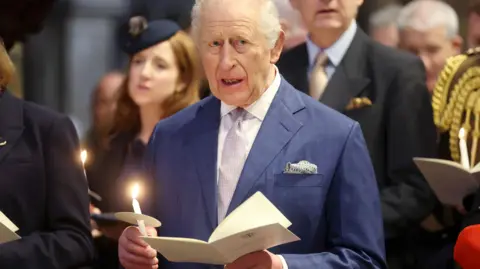 PA Media
PA MediaThe King also spoke of how much he had been "profoundly moved by what I can only call the 'community of care' that surrounds every cancer patient - the specialists, the nurses, researchers and volunteers who work tirelessly to save and improve lives".
Until now the King has said little publicly about his illness.
He didn't seem to want to be defined by the disease and his approach has been to keep working, with a busy schedule including overseas trips and hosting state visits, including last week's by the German president.
A couple of days ago he was sending a message of optimism and seasonal "hope", when he attended an atmospheric, candle-lit Advent service at Westminster Abbey.
The Stand Up To Cancer show, presented by celebrities including Davina McCall, Adam Hills and Clare Balding, has urged people not to be frightened of getting cancer checks.
In particular, the show has appealed to the estimated nine million people in the UK who Cancer Research UK says are not up to date with NHS screening schemes, offering an online checker to let people see if they are eligible for tests for breast, bowel and cervical cancer.
The King said it "troubles me deeply" that this represents nine million missed opportunities to catch cancer early - and he urged people to use the screening checker online tool.
"The statistics speak with stark clarity. To take just one example: When bowel cancer is caught at the earliest stage, around nine in 10 people survive for at least five years. When diagnosed late, that falls to just one in 10," he said.
According to royal sources, the King's reference to bowel cancer should not be seen as linked to his own condition, and prostate cancer has previously been ruled out.
In an attempt to demystify cancer checks and show the value of early diagnosis the Stand Up To Cancer show had a live broadcast from cancer clinics at Addenbrooke's and Royal Papworth hospitals in Cambridge.
"I want to take the fear out of cancer screening and show everyone that they are not on their own in this," said McCall, 58, who recently said she was recovering from breast cancer surgery.

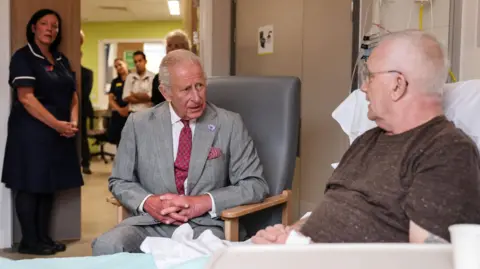 Reuters
ReutersCurrently in the UK, there are three NHS cancer screening programmes - for bowel, breast and cervical cancer - available to certain age groups.
A new lung cancer screening programme is also being slowly rolled out for anyone at high risk of developing the disease, specifically targeting people aged 55-74 years old, who currently or used to smoke.
Men may enquire about prostate cancer checks, but there is no national programme in place.
The Stand Up to Cancer project, which has raised £113m since 2012, is funding 73 clinical trials involving 13,000 cancer patients.
Michelle Mitchell, chief executive of Cancer Research UK, said public figures speaking openly about cancer can encourage others to have a check up.
"Spotting cancer early can make a real difference and provides the best chance for successful treatment," she said.


Sign up here to get the latest royal stories and analysis every week with our Royal Watch newsletter. Those outside the UK can sign up here.
Robert Rhodes plotted to kill his wife - years later, his child's evidence convicted him

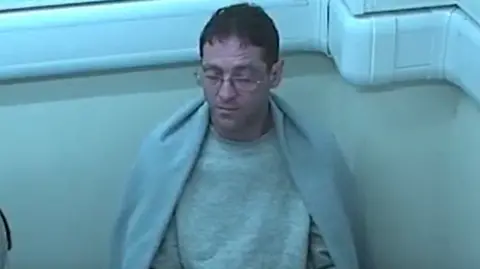 Surrey Police
Surrey PoliceOn a bank holiday evening in 2016, Robert Rhodes turned to his child and said: "Do you want to get rid of Mum?"
Those words, the child recalled years later, were the start of a plot for Rhodes to kill his wife, Dawn, in their Surrey home and cover up her death as an act of defence - of himself and his child.
For years, Rhodes painted himself as a victim of an attack in the killing he planned and covered up.
Described as swift and protective, jurors heard accounts of a father who moved to protect his child from their knife-wielding mother, who lost her life in the skirmish that ensued.
'Web of lies'
But now, that account has fallen apart, revealed to be a web of lies created and maintained by Rhodes over more than nine years.
Instead, a new trial revealed a complex tale of abuse, control and a murder plot with the coercion of a child at its heart.
On 2 June 2016, the child, who cannot be named for legal reasons, went to their mother and said: "I drew a picture for you, close your eyes and hold out your hands."
Then, with the child leaving the room and locking themselves in the bathroom, Rhodes cut his wife's throat with a kitchen knife.
To cover up the killing, Rhodes once again turned to his child, telling them he "needed a favour".
The favour, the child told police in 2022, was to stab their father in the back of the shoulder, with the same knife used to kill Dawn, and then let him cut their arm.

 Surrey Police
Surrey Police"I didn't want to do any of it. I just felt guilty but I did what I was told," the child said during the police interview.
Despite the child crying and objecting at the time, Rhodes reportedly said: "We've done this now. There's no going back."
The child also told their therapist in 2021 that Rhodes had stabbed himself in the back of the head, causing himself another wound he would claim was caused by his wife.
As they were under 10 years old at the time of the murder, the child bears no criminal responsibility for aiding the attack.
Life insurance
The death of Dawn Rhodes followed the end of a marriage in turmoil, with the couple in the process of separating after revelations of infidelity.
The pair had known each other for more than 20 years, having met when Rhodes was 21 and Mrs Rhodes was 18, the court heard.
Having married in 2003, the couple lived in Epsom and across Surrey, before settling in Wimborne Avenue in Earlswood, near Redhill.
But on Christmas Eve in 2015, Robert Rhodes found out about an affair that Mrs Rhodes had been having with a co-worker.
From that point, Mrs Rhodes would claim to family members that Rhodes would self-harm in front of her and threaten to kill himself.
Internet searches made by Rhodes show him researching methods of suicide, as well as about life insurance.
He told the court: "I didn't see a future in our marriage."
Rhodes also admitted to creating a fake Facebook profile and contacting the wife of Mrs Rhodes' new partner to tell her about the affair.
Later, he would message his wife's partner: "Thank you for screwing my life and wife."
'Like the Hulk'
The child continued in their second set of police interviews: "There was a plan and we went through with it. I was told to lie and I did."
But shortly after the killing, the child originally told police how, after another argument between Rhodes and his wife, they had tried to intervene.
As part of the cover-up of their father's attack, the child said their mother picked up a knife and swung it at their arm, delivering the cut to their arm which was, in fact, administered by Rhodes.
The child described Dawn's "rage" and "anger" in a police interview in May 2017, before being told to run upstairs and "lock yourself in the bathroom".
In his own police interview, an emotional Rhodes told officers how he "grabbed the blade" of the knife and "held it as tight as I could".
Weaving his story together, he told officers: "I was scared, and it takes a lot to scare me.
"It's like one minute she [Dawn] is fine and the next minute she's like the Hulk," he added, referring to the comic book superhero.
Rhodes was previously acquitted of murder during a trial at the Old Bailey in May 2017.
'Snitches get stitches'
Despite the façade put up by the child, witnesses in the trial pointed to signs that the truth lay beneath.
In a conversation while together in a car, when asked about their scar from the incident, the child would tell one adult: "It was the sharp bit [of the knife], that's how dad did it."
The child would later allege that, while on supervised visits, their father would attempt to speak to them, telling them to "stick to the plan".
They would later suggest their father would message them on a phone he had secretly given them, again urging them to continue backing his version of events.
In an unrelated conversation years later, other witnesses revealed how they heard Rhodes tell the child: "Snitches get stitches."

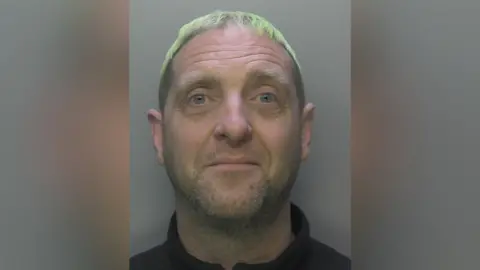 Surrey Police
Surrey PoliceYears passed, and the child continued at school and made new friends, while the truth of what happened continued to eat at them inside.
In November 2021, the child confided the truth in a close friend, who recalled: "I asked if they felt guilty, they said yes - like this guilt had been bothering them. They were distraught."
The following day, the child would then tell their therapist, who alerted police.
Double jeopardy
Following an appeal to the Court of Appeal in November 2024, Rhodes was retried under the double jeopardy rules.
It meant that, due to the compelling new evidence brought forward by the child, he could be reexamined for the crime he was acquitted of in 2017, as well as charges of child cruelty, perverting the course of justice and perjury.
At his new trial, Rhodes would often sit staring ahead, his eyes occasionally darting over to the 12 people hearing his case.
While the court listened to more gruesome details of the murder, Rhodes would hunch over and stare at the floor and, on one occasion when evidence was being read out, he sat shaking his head and mouthing "nope" out into the courtroom.
As jurors convicted him, he stood silently in the dock.
'Motherhood brought her joy'
Following the trial, Mrs Rhodes' family - mother Liz Spencer, sister Kirsty Spencer and brother Darren Spencer, paid tribute.
Her mother said: "Dawn was a loving daughter, sister and mother. Being a mother was what brought joy to Dawn.
"During her life, Dawn was looking for someone to build a life with. She was looking for someone to love and be loved by someone to trust and be trusted by and someone to respect and be respected by."
Kirsty added: "Dawn was my sister and I loved her dearly.
"I know my sister would want us to find freedom, a freedom that she was deprived of."
Her brother Darren added: "Dawn was a very capable woman, but unfortunately went through hell in the last few years of her life.
"The pressures on her at the time meant that she wasn't the Dawn we all knew, and the last few times we saw her before she was taken from us, she was at the end of her tether."
Rhodes will be sentenced at Inner London Crown Court on January 16.
Follow BBC Surrey on Facebook, on X, and on Instagram. Send your story ideas to southeasttoday@bbc.co.uk or WhatsApp us on 08081 002250.
Avatar composer reveals the secrets behind a soundtrack that took seven years to create

 20th Century Studios
20th Century StudiosIt's no secret the Avatar films are a gigantic technical feat - pushing the boundaries of cinematography, animation and performance capture.
But you may not be aware that the same applies to the music.
Composer Simon Franglen says work on the third instalment, Avatar: Fire and Ash, took an epic seven years to complete.
Along the way, he wrote 1,907 pages of orchestral score; and even invented new instruments for the residents of the alien planet Pandora to play.
And, with director James Cameron tinkering with the edit until the very last minute, the British musician only finished his final musical cue five days before the film was printed and delivered.
In total, Avatar contains "four times as much" music as a standard Hollywood film, says Franglen, with almost the entirety of its 195-minute running time requiring music.
"But I got 10 minutes off for good behaviour," he laughs.

 20th Century Studios
20th Century StudiosFire and Ash is the third instalment in the record-breaking series, continuing the saga of the blue Na'vi population, who are protecting their planet from human invaders, intent on stripping its natural resources.
The new film, released on 19 December, takes audiences back to the astonishingly vivid landscapes of Pandora, but it also sends them on a visceral emotional journey.
At the start of the film, the two main characters Jake Sully (Sam Worthington) and Neytiri (Zoe Saldana) are mourning the death of their teenage son, Neteyam.
Unable to see eye-to-eye, the grief threatens to tear the couple apart.
Franglen was tasked with creating a score that could reflect the depth of their despair.
"I wanted to make sure that you felt that sense of distance that was growing between them," he says.
"So what I would do is, I would take two lines [of music] and I'd have them moving apart, or I would make them go wrong, so that they felt austere and cold and disconnected."
"Grief is not something that is ever addressed in these sorts of films," he continues, "but for any family, the loss of a child is the worst thing you can go through.
"Musically, the important stuff is often the quiet moments."
A hoedown on a galleon
By contrast, when Franglen composed the music for the Wind Traders - a nomadic clan of salesmen, who travel by airship - he could let his imagination run wild.
Their swashbuckling themes are inspired by the action movies of the 1930s and 40s, but they also feature brand new instruments, unique to Pandora.
"When we meet the wind traders [they're having] a hoedown on their enormous Galleon," says Franglen.
"The problem was that, if you are having a Pandoran party, what do they play? I can't give them guitar, bass and drums. I can't give them a banjo.
"You have to have a real instrument that would be designed for three metre-tall, blue people with four fingers.
"And because Avatar is not animation, when there are instruments on screen, you have to have the real thing," he says, referring to Cameron's rule that everything on screen has to be rooted in reality, even though the film's imagery is largely computer-generated.
"So I sketched out some instruments, and gave them to the art department, who made these beautiful designs."

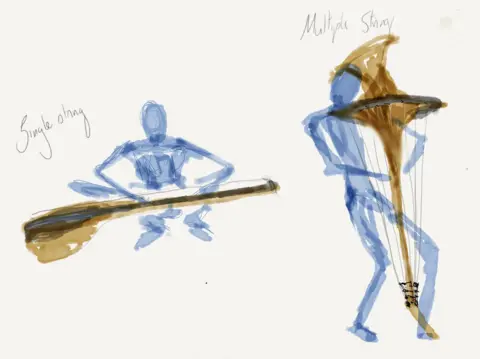 20th Century Studios
20th Century StudiosFranglen's creations included a long-necked lute, similar to a Turkish saz, with strings that represent the rigging of the Wind Traders' ship.
A percussion instrument was also designed, with the drum head using the same material as the vessel's sails.
The art department's renders were then given to prop master Brad Elliott, who built the instruments on a 3D printers, and the actors played them for real on set.
For now, however, these inventions have no official name.
"They are currently called 'the stringy things' and 'the drummy things'," laughs Franglen.
"I'm sure there's a better name. Somebody said we should have a competition."

 20th Century Studios
20th Century StudiosFranglen's musical career started when he was just 13 years old- he wrote a letter to the BBC asking how someone would go about becoming a record producer.
Mistakenly assuming he was asking about radio production, the corporation advised him to study electronics - leading him to a course at Manchester University in the early 1980s.
He arrived just as the Hacienda Club opened ("I was member 347") and spent his free time booking bands for the college's concert venue.
"I remember booking Tears for Fears and 11 people came," he says.
After graduating, he was hired to work as a synth programmer, and was introduced to Trevor Horn - who set him to work on pivotal 80s albums by Yes and Frankie Goes To Hollywood.
Eventually, he decided to try his luck in America where, "after six months of doing almost nothing", he became an in-demand session musician and programmer.
Credits started to rack up on hits like Toni Braxton's Unbreak My Heart, All 4 One's I Swear and Whitney Houston's I Have Nothing; and he eventually found himself programming drums for Michael Jackson's HIStory album.
"The pressure was to make it great," he says. "To have that sense of groove, what we call, 'the pocket'.
"And a big part of my career is that I had a good pocket. I understood where things should feel and how they should hit. And that is as important with film scores as it is when you're making a Michael Jackson record."
Franglen's first experience of film scoring came when Bond composer John Barry asked him to assist on Kevin Costner's Oscar-winning Dances With Wolves. He was later hired to do the "dark and nasty stuff" on David Fincher's Se7en.
"My job was to provide the dystopian edge that that score has. So I would take squealing brakes, make samples of them, and then play all the violin lines with squealing brakes underneath.
"There was a lot of experimental stuff, which was incredibly fun."

 Getty Images
Getty ImagesFranglen first met Avatar director James Cameron after being hired by legendary film composer James Horner, to work "on a film he had no money for".
The film was Titanic - a notorious white elephant, dismissed as a vanity project, and predicted to bring about the collapse of film studios Fox and Paramount.
The composer had seen the headlines, but when Cameron showed him the scene where the Titanic broke in half and started to sink, he realised the press had got it wrong.
"It was just astonishing, in comparison to anything you'd seen before. I knew it was special."
Even so, there was no budget left for the music, Franglen had to borrow equipment and instruments from the manufacturers, and the majority of the score was recorded on synthesizers in a rented apartment.
"Part of the reason that Titanic sounds the way that it does, is because there wasn't enough money for [an] orchestra everywhere," he says.

 Getty Images
Getty ImagesThe opposite is true on Avatar.
"Jim [Cameron] still believes that the good things take time. And as a composer, having that ability to refine and to make something special is something that is rare these days."
The director also went to great lengths to ensure his latest film is free from artificial intelligence.
"He very specifically asked me, 'So, we're not using any AI? We're not putting any real musicians out of work'," Franglen recalls.
"It's fair to say that if you gave a lot of film producers the option to save money, they would take that option.
"Jim is in a situation where he will not compromise, and that's as important when it comes to the music as it is to the live performances of the actors."
As the film prepares to open, Franglen is celebrating a Golden Globe nomination for the theme song, Dream As One, sung by Miley Cyrus.
But he's also thinking about what comes next. Cameron has already completed the scripts for Avatar Four and Five; scheduled to come out in 2029 and 2031.
"Four is… I think it's astonishing," says Franglen. "It goes into whole new territories, and I love it."
Initial footage has already been shot, but Cameron says completing the film will depend on the box office performance of Fire and Ash.
"I really hope that we break even, so that we can make it," says Franglen.
"I think they said after Avatar Two that the break even point was $1.4 billion (£1 billion).
"I have no way of knowing, but I presume that it's a similar number for this one.
"So if the audience tells us that they want an Avatar Four, I'm very much looking forward to doing that."
Online gaming escaped Australia's social media ban - but critics say it's just as addictive

 Getty Images
Getty ImagesWednesday afternoons have become a ritual for 15-year-old Sadmir Perviz. It's a circuitous route from home in Perth to the Fiona Stanley Hospital - but it's worth it, he says, to sit down for a game of Dungeons & Dragons with people he may not know but with whom he shares a great deal in common.
Sadmir and his board game companions are just some of the 300 patients at the gaming disorder clinic, Australia's only publicly-run institution of its type, helping patients wean themselves off excessive online gaming habits.
The room where they meet is a simple space in a faceless hospital but in the corner, there's a pile of boardgames on a chair. Jenga, Uno and Sushi Go are also popular choices at the informal group which is attended by both patients and clinicians.
It's a bit of a departure for the 15-year-old who until a couple of months ago preferred to play games with friends online for 10 hours a day.
"It feels completely different," says Sadmir. "You get to roll the dice instead of clicking a button. You can interact with people, so you actually know who's there rather than just being on a call with random people."
Dr Daniela Vecchio, the psychiatrist who set up the clinic, says that while gaming isn't bad in itself, it can become a problem - an addiction even.
Gaming platforms and social media pose similar risks for children: excessive time spent online, and potential exposure to predators, harmful content or bullying.
So she wonders why gaming platforms have not been included in Australia's "world-first" social media ban for under-16s.
The ban, which came into force on Wednesday, is supposed to prevent teens from having accounts on 10 social media platforms including Instagram, Snapchat and X. Children will still be able to access platforms like YouTube and TikTok, but without accounts.
For Vecchio, the omission of gaming platforms is odd.
"It doesn't make much sense," she says.
"Gaming and social media are so interconnected, it's very difficult to separate.
"The individual who plays games for excessive amounts of time also spends excessive amounts of time on social media platforms where they can see other gamers or can live stream gaming, so it's a way to connect."

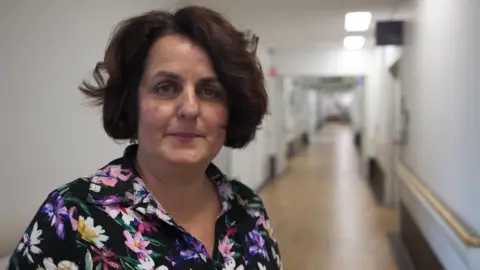
Sadmir, for example, spent much of his time on the gaming platform Steam, as well as YouTube. Dr Vecchio singles out the platforms Discord and Roblox as particular worries - a concern echoed by many experts and parents the BBC has spoken to in covering the ban and its impact.
Both Roblox and Discord have been dogged by claims that some children are being exposed to explicit or harmful content through them and are facing lawsuits relating to child safety in the US.
Roblox introduced new age assurance features in Australia and two other countries weeks before the social media ban kicked in, with the checks due to be rolled out to the rest of the world in January. The checks will "help us provide positive, age-appropriate experiences for all users on Roblox", the company said.
Discord also introduced age checks on some features earlier this year and on Wednesday said it was introducing a new "teen-by-default" setting for all Australian users.
The 'wild west of internet usage'
Former gaming clinic patient Kevin Koo, 35, wonders whether a social media ban could have influenced the access he got at a younger age.
"I was growing up in the wild west of internet usage so, there weren't any restrictions," he says. "I got free rein on the internet basically. So I think that for me, the damage has already been done."
A former quantum finance intern interested in AI, Mr Koo lost his job just before the pandemic. Living in Sydney, he had no family nearby and no regular work. He says he lost confidence and ended up consumed by online gaming, likening his experience to substance abuse.
Dr Vecchio agrees with the comparison - if she had her way, she'd be tempted not just to expand the social media ban to gaming but to raise the age to 18.
Gaming disorder is also now recognised by the World Health Organisation as an official diagnosis and, according to a 2022 Macquarie University study, around 2.8% of Australian children are affected by it. Vecchio thinks the number at risk is higher.


The Australian government says its ban is about protecting kids from harmful content, cyberbullying, online grooming and "predatory algorithms" among other things – some or all of which could arguably be said to exist with gaming platforms.
The Australia Federal Police are among those who have warned chatrooms on these sites are hotbeds for radicalisation and child exploitation.
But, as the eSafety Commissioner said last month, the legislation enforcing the ban means platforms were not selected according to "safety, a harms or risk-based assessment".
Instead, platforms have been selected according to three criteria: whether the platform's sole or "significant purpose" is to enable online social interaction between two or more users; whether it allows users to interact with some or all other users; and whether it allows users to post.
Exceptions were made for gaming, for example, because its primary purpose is not social-media style interaction.
The law, say some experts, makes no sense.
"It's incompetence, it's reactionary," says Marcus Carter, professor of human-computer interaction at the University of Sydney.
"Social interaction is not a bad thing… There are a bunch of probably legitimate concerns about these big tech platforms and what they are affording children and what they are exposing them to so as a result we've said we are banning social media.
"I just wish the government was trying to figure out how to help rather than put a band-aid on a bullet wound," he says.
Tama Leaver, professor of internet studies at Curtin University and chief investigator at the ARC Centre of Excellence for the Digital Child, also says the ban on social media is too blunt a tool – instead a more nuanced approach is needed, including towards gaming platforms.
"There is such a wide spectrum of gaming from incredibly positive, nurturing, fun, creative, expressive spaces - something like Minecraft comes to mind where it's had so many positive uses." However, platforms like Roblox are at the other end of the spectrum, he says.
"Roblox isn't a game. It's a series of enabling tools for other people to make games. And we know that some of the games that have been made that clearly feel like they're meant for adults have been accessed by very young people."
On Professor Leaver's desk at the university are three plushies with inbuilt ChatGPT inside them. On the box, it says they are suitable for three and above. This, he says, has also gone too far.
"I do think there needs to be age-appropriate regulation," he says, referring to young people going online. "I do think we're at a moment, and it's not just Australia, you look across the EU, there is huge appetite for all sorts of regulation."
A treatment plan, not a cure
In Mr Koo's case, for example, his vice wasn't just gaming. It was AI chatbots, another feature of online life that has come under scrutiny for everything from making things up to allegedly encouraging children to kill themselves.
There is evidence they are designed to manipulate users into prolonging interactions and their use has even given rise to a new phenomenon called AI psychosis, in which people increasingly rely on AI chatbots and then become convinced that something imaginary has become real.
Mr Koo also started googling his mental health issues and relying on AI to help confirm his diagnoses.
"You're Googling stuff that you think you already know and then you kind of tick the box after that saying, oh, I've already done my work for today, my therapy work with ChatGPT," he says. Mr Koo suffered a psychotic episode and after extensive therapy with a professional, he now takes a different approach.
"I might Google or ChatGPT something and then I'll check it with my therapist in person," he says. "I do think being able to read human emotions and having that face-to-face conversation with someone is completely different."
The government has said it will continually review the list of banned platforms and at the end of November added Twitch, a streaming platform where people typically play video games while chatting to viewers.
Communications Minister Anika Wells also told the BBC last week that the eSafety Commissioner "definitely has her eye on Roblox". And, she said, the social media ban "isn't a cure, it's a treatment plan" that will "always evolve".
The demand for platforms to do better is growing. So too are the queues of families waiting to get help at the gaming disorder clinic, but Vecchio has to turn them away.
"[The legislation] is excluding platforms where children interact with many others and some of them can be people who harm them," says Vecchio. "Children need to be protected, they need to be safeguarded."
An eyebrow tip and McDonald's footage: Takeaways from Luigi Mangione's evidence hearing

 Getty Images
Getty ImagesLuigi Mangione, the man accused of fatally shooting United Healthcare CEO Brian Thompson in a case that sparked national attention, watched as new testimony and never-before-seen footage from the day of his arrest in a McDonald's was unveiled during a hearing this week.
Mr Mangione has pleaded not guilty to state charges related to the 2024 murder of Mr Thompson, a father of two, as well as federal counts that carry the possibility of the death penalty.
The pre-trial hearing is focused on the defence's attempts to keep certain evidence out of the trial, which has not been scheduled yet, including items found in his backpack during his arrest and statements he made to officers.
During the first two weeks of the hearing, supporters of Mr Mangione - the scion of a prominent Maryland family and Ivy League graduate - filled the back rows of the Manhattan criminal courtroom, some wearing a pin portraying him as a saint-like figure.
Prosecutors and Mr Mangione's legal team are expected to question over a dozen witnesses from the day of his arrest, including the employees who spotted him and the police who arrested him.
Here is a look at some of the key pieces of evidence discussed that offer a window into Mr Mangione's trial.
An eyebrow giveaway
The pre-trial hearing has centred on the small-town McDonald's in Altoona, Pennsylvania, where officers were shocked to find the high-profile suspect days after Mr Thompson was fatally shot - and hours from the busy Midtown Manhattan crime scene.
Witnesses suggested the arrest may never have occurred there if not for one of Mr Mangione's key features: his eyebrows.
During the first day of the hearing, prosecutors played a call to police from a McDonald's employee about a tip from a customer in the restaurant.
The employee said the customer thought a patron looked like the suspect in the United Healthcare CEO shooting. The patron was well covered, wearing a black hoodie, a medical mask and a tan beanie. But one key detail stuck out.
"The only thing you can see is his eyebrows," the employee told police.
It was not the only time Mr Mangione's distinguished eyebrows have come up.
Prosecutors also entered into evidence notecards they say Mr Mangione had, which appeared to be to-do lists for the days after the high-profile shooting.
One card reads: "Keep momentum, FBI slower overnight," while another said: "Change hat, shoes, pluck eyebrows".

 New York County District Attorney's Office
New York County District Attorney's Office'Proposterous': An unexpected day at McDonald's
Dozens of videos released by prosecutors show Mr Mangione's encounter with police and his eventual arrest in the McDonald's as other customers watched.
Officers who responded narrated the footage this week, telling the court what was going through their minds as they realised the 27-year-old appeared similar to the suspect in photos.
On Thursday, Altoona Lieutenant William Hanelly said a fellow officer responded sarcastically that he would "get right on it" when he heard the tip about the suspect.
Mr Hanelly told the court that he understood the sarcasm, because it seemed "preposterous" that a shooter from "New York City had found his way to a McDonald's in Altoona, Pennsylvania".
But at the scene, officers said they quickly saw the resemblance to New York Police Department pictures circulated to the public after days without any leads.
"It's him. I'm not kidding. He's real nervous. It's him," one officer can be heard telling Mr Hanelly in a phone call played for the court.
In one video, Mr Mangione eats a McDonald's meal as officers stand guard around him in the restaurant waiting for more officers to arrive.
At the hearing, Mr Mangione watched the videos quietly from the defence table, seated next to his lawyers - wife and husband Karen Friedman Agnifilo and Marc Agnifilo. The latter defended Sean "Diddy" Combs, who was acquitted of sex trafficking and racketeering charges just months earlier.
Wearing a grey suit and button-down shirt most days, Mr Mangione frequently took notes on a legal pad, and occasionally smiled and laughed with his lawyers.
A fake name leads to an arrest
In the series of police body camera videos played for the court, Mr Mangione's interactions with officers eventually lead to his arrest on 9 December as Christmas music plays loudly in the background of the McDonald's.
When officers first speak to Mr Mangione, they ask him to pull his mask down. He listens, and is heard telling officers his name is "Mark Rosario", handing them a New Jersey identification that police later said was false.
That identification gave officers enough cause to arrest Mr Mangione, Mr Hanelly told the court, and in the video, Mr Mangione tells officers his real name is Luigi.
In another body camera video, an officer tells the 27-year-old he is under police investigation for giving a fake identification and Mr Mangione is seen putting his hands on the wall as officers arrest him.
They then take a photo of Mr Mangione with his hands behind his back, an image widely circulated on social media after his arrest.
Bullets, a journal and cash: a peak into Mr Mangione's backpack
The pre-trial hearing also shed light on the items Mr Mangione was carrying when he was arrested.
Mr Mangione's lawyers have argued that a 9mm handgun as well as a notebook should be excluded from trial because officers did not have a warrant to search his backpack. Prosecutors allege that Mr Mangione wrote in his notebook about "the deadly, greed-fuelled health insurance cartel".
During the hearing on Thursday, Mr Hanelly argued that there were exceptions for warrants.
Earlier in the week, Ms Friedman Agnifilo questioned the officer who searched Mr Mangione's backpack, arguing they were searching the bag "because you thought he was the New York City shooter".
"No, we search everyone," said the officer, Christy Wasser.

 New York County District Attorney's Office
New York County District Attorney's OfficeVideo played in court shows a police officer pulling a series of items from the backpack, including a handgun magazine that Mr Hanelly said contained 9 mm bullets - all as Holly Jolly Christmas plays over the speaker.
One law enforcement official comes across a journal in the backpack, and can be heard saying it reads like a "manifesto".
Ms Agnifilo objected after the "manifesto" part of the video was played repeatedly in court, arguing the prosecutor wanted to emphasise the line.
Eventually, Mr Hanelly testified, the officers decided to stop searching the backpack and take it to the police station because "it was going to be a mess".
Prosecutors this week entered into evidence images of other items Mr Mangione had with him, including a gun, a silencer, dozens of $100 bills, face masks, a hair trimmer and a passport.
The hearing is expected to continue into next week.
‘A lone person battling the system’ - hundreds reveal struggle to get help for adopted children

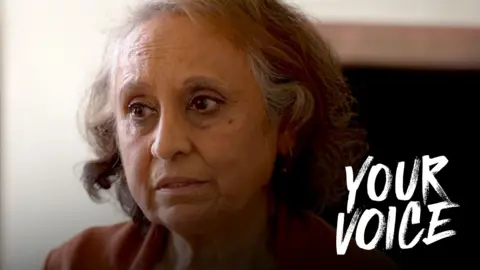 BBC
BBCHundreds of parents have contacted the BBC about their struggles with getting support for adopted children - as charities call for a government review.
The response came after we reported last month that more than 1,000 adopted children had been returned to care over five years. Dozens of adoptive parents told us they had been blamed for the difficulties of often traumatised young people.
Mina, who contacted BBC Your Voice about her son who died last year from alcoholism, said: "You're just a lone person battling, trying to battle the system."
The charity Adoption UK said it had raised the issue with England's children's minister this week, calling for permanent funding for therapy and a wider review of the support available.
Mina was one of 700 people who contacted the BBC in response to the story, many of whom said they were adoptive parents who had struggled to get help for their children or had been blamed for their emotional and behavioural difficulties.
She and her husband adopted their son Leighton at the age of three, after he was removed from his birth mother when he was 18 months old. He struggled all his life with his mental health and addiction, she says.
"He turned all this pain inside, like I'm not worthy, I'm not lovable," says Mina. She believes his distress over his adoption led to his heavy drinking and death from liver failure at the age of 26. "He couldn't understand why."
Even as a four-year-old, Leighton would have periods of "deep depression" but his parents' concerns were brushed off by social workers, Mina says. When he was older, she adds, he would self-harm and began taking drugs and abusing alcohol.
She says social workers blamed her and her husband for Leighton's struggles, insisting "it must be something happening at home".
"There's a perception that once a child's adopted, they'll live happily ever after, and there is no platform to complain or to even have your voice," Mina says.
Mina's local authority did not respond to a request for comment.
Children's charity Coram - one of several organisations to call for greater support for adoptive families or to raise concerns about the blaming of parents in response to our story - says the adoption system is "under exceptional strain".
"It's shocking to discover again that adoptive parents, are experiencing blame as the first response when they seek help. That should never be the case," said CEO Dr Carol Homden.
She says "adoption remains an extremely important part of our care system and highly successful for the majority of children" but when children have been removed from their birth families for their own protection, "we need to recognise that they will need potential support for life and ensure that our services are there in a timely and sufficient way".

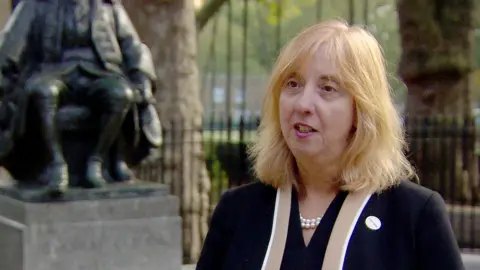
Coram also runs the largest body representing children's social workers, CoramBAAF, which has joined the call for a review of adoption support, saying: "We must get this right for the children at the heart of this."
James - not his real name - told us he was reassured to learn he was not the only parent to have gone through something like this and now feels he "owes it to our adopted son" to speak out himself.
He says he adopted a child who had severe foetal alcohol spectrum disorder (FASD) - a condition caused by drinking in pregnancy that can lead to physical and mental problems.
As he grew older, James says, his adopted son's behaviour was sometimes violent because of his condition.
'Heavily blamed'
One social worker suggested they should live in separate homes, says James, with one parent living with their adopted son and their other children staying with the other parent in the family home. A social worker also admitted, he adds, that social services staff had not been trained to deal with FASD.
"We took on a child knowing there'd be issues. We didn't expect everything to go perfectly because it doesn't. But when you ask for help, they need to help," he says.
Eventually, he felt his adopted son was no longer safe to live with the other children - James told us - and he arranged for him to be accommodated in care again.
James says they struggled to remain in contact with him.
"It was almost like, me and my children, that we weren't to exist anymore because we'd been heavily blamed," James says. "We were literally removed from from his life. They were more bothered on him seeing family pets than step-siblings."
His local authority said it could not comment on individual cases, but pointed to research which it says shows that outcomes for adopted children are "overwhelmingly successful".
The government says adoptive parents do "an incredible job providing a loving and supportive home" to vulnerable children, and while those arrangements do sometimes break down, support is in place to keep them together where possible.
We also heard from some parents who did receive good support and who say it made a huge difference.
Emma and her husband Geoff says they adopted their daughter, who needed extensive help, when she was nearly six. The local authority had an established relationship with a family therapy provider which specialises in adoption, Family Futures.

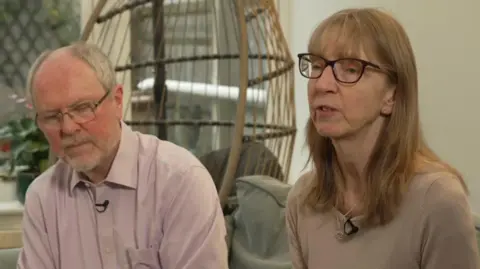
"They understood that adoption and therapy need to go together," she says. "When we asked for some help they were very keen to give it. They realised if they don't do it now, things get worse, children go back to care and it all falls apart."
Adopted children who have been moved first into foster care, and then into an adoptive family, struggle to feel safe, says Emma, and the family therapy was aimed at addressing that.
"If you imagine being a small child and being put from pillar to post with different people and then you arrive virtually into a stranger's house, you are going to be very scared," she adds.
Geoff said it took about 10 years of seeing a therapist, on and off, before their daughter trusted them.
Without that support, he says he can't see how she would have been able to achieve as much as she has now that she is 21, having moved into supported living accommodation and still keeping in touch with her parents.
"We used to think that we couldn't imagine how she could ever leave home," says Geoff. "Now she's able to live away from us. She's got a place where she feels she belongs."


Young care leaver facing homelessness was 'left to own devices'

 Klarisse Smith
Klarisse SmithWhen Klarisse Smith started living in a homeless hostel in Birmingham at the age of 16, she had been in the care system for two years.
She had spent that time moving between her foster carer, her aunt and her partner's family.
"I felt like my social worker just kind of washed her hands of me when I went to my auntie's," she said.
"I didn't really have much contact with anyone. They just left me to my own devices and at the time I just thought this was pretty normal."
New government data shows the number of households in England with at least one young care leaver facing homelessness has risen by 37% in the past five years – more than double the increase for the general population.
The care charity Become said the figures showed "a complete failure in support for care leavers".
A government spokesperson said the risk of homelessness faced by care leavers was "unacceptable" and it was making "record investment" in social and affordable housing.
Klarisse, now 24, said: "Being homeless kind of strips your confidence away. It eats at your self worth and has you feeling like it's never gonna change."
She remembers her social worker being on leave a lot and only visiting her at the hostel when she was waiting on her Universal Credit claim.
"I had nothing to sustain me within the six weeks, so she gave me £50 a week and she'd drop it round in cash," she said.

 Klarisse Smith
Klarisse SmithIt was difficult to ask for support during those years, Klarisse said.
"If you're not the type of person to want to constantly be nagging someone, then you just kind of get left under the system," she said. "You have to constantly be making the calls and the emails."
While Birmingham City Council said it could not comment on individual cases, it acknowledged the "significant challenges" young care leavers like Klarisse faced when transitioning to independent living.
A spokesperson said cover arrangements were "always in place" to ensure continuity of support when a social worker was unavailable and it was committed to ensuring care leavers had safe accommodation and the support they needed.
They said Birmingham had commissioned a Care Leaver Pathway since January 2025 to support 16 to 17-year-olds who were homeless or in care, focusing on life skills, youth engagement, education and training.
Klarisse sat her A levels while at another hostel. She then did a social work degree and this summer completed a scholarship programme for clinical medicine at the University of Oxford.
She said: "I studied social work because I got an understanding of the social care system. I'm a care leaver myself, and I feel that I can relate to a lot of people, especially foster kids. I can instill some confidence into them."
It took a "special kind of person" to be a social worker, she said, because things that might not seem significant to others could mean "literally everything" to a child in the care system.
She said: "When you're a child, you're a lot more sensitive. So, putting their clothes in bin bags, for example, might just be a form of transporting them. But to a child, it feels like there's something they've done wrong to be treated like this. They treat people the same when they come out of jail."
New figures from the Department of Housing, Communities and Local Government (DCLG) show there were 4,610 18 to 20-year-old care leaver households facing homelessness in 2024-25, up 37% from 2019-20.
The number in the general population has risen 14.5% since 2019-20, to 330,410 in 2024-25.
The data tracks those who have been assessed by their local authority as homeless or threatened with homelessness, and so have received a relief or prevention duty.
Clare Bracey, director of policy, campaigns and communication at Become, warned not all cases show up in official statistics.
"Part of the problem is that young people aren't reaching out for support," she said.
A DCLG spokesperson said: "Our Homelessness Strategy will set out bold steps to prevent homelessness and deliver lasting solutions, and our landmark Children's Wellbeing and Schools Bill will require public bodies to consider the support young people need when leaving care."
Ms Bracey said the government was "taking forward really positive developments" with the bill.
It would require local authorities to support care leavers up to the age of 25 to help them transition into independent living.
"We want to make sure that it is really clear who that support applies to, that there is a broader definition of that support and that young people have a say in what support they should get," Ms Bracey added.
A Local Government Association spokesperson said: "In order to effectively reduce homelessness and tackle housing waiting lists, councils need the powers and resources to build or acquire more of the genuinely affordable homes our communities desperately need."
They added there were currently 132,410 households living in temporary accommodation, costing councils £2.8bn a year.
中国提出明年力争基本实现政策范围内分娩个人无自付
在中国人口减少的背景下,中国官方提出明年要积极适应人口发展战略,力争全国基本实现政策范围内分娩个人无自付。
中国国家医疗保障局在官网公布,星期六(12月13日)召开的全国医疗保障工作会议,要求明年积极适应人口发展战略,推动生育保险和长期护理保险发展。推动将灵活就业人员、农民工、新就业形态人员纳入生育保险覆盖范围。
会议也提出,合理提升产前检查医疗费用保障水平,力争全国基本实现政策范围内分娩个人“无自付”。将适宜的分娩镇痛项目按程序纳入基金支付范围。全面实现生育津贴按程序直接发放给参保人。全面推进长期护理保险制度,优化长护服务供给。鼓励商保机构开发商业长期护理保险产品。
在总结“十四五”时期医保工作方面,会议指出,31个省(区、市)及新疆生产建设兵团均已将符合条件的辅助生殖项目纳入医保,七个省份实现政策范围内住院分娩医疗费用全额保障,95%的统筹区将生育津贴直接发放给参保人。
随着人口迅速老化,中国正从限制生育转向鼓励生育。中国人口已连续三年减少,2024年出生人口达到954万,为2016年1880万的大约一半。
官方因此推出了一系列鼓励生育的政策,包括发放现金补贴、改善托幼服务以及延长陪产假和产假,还宣布了减少“非医疗必要”堕胎的指导方针等。中国也将从明年起,对避孕药品和用具包括安全套征收增值税。
中国选手首获霹雳舞世锦赛冠军 连胜三位日本选手
中国霹雳舞选手郭朴赢得世界霹雳舞锦标赛女子组冠军,是中国选手首次获得霹雳舞世锦赛金牌。
新华社报道,星期六(12月13日)在日本福冈举行的2025年世界霹雳舞锦标赛女子组比赛中,中国选手郭朴从八强战开始连续战胜三位日本选手,最终夺得冠军。
郭朴今年6月在2025年亚洲霹雳舞锦标赛也夺得女子组冠军。
财政部中共党组:重视解决地方财政困难
中共中央经济工作会议召开后,财政部党组也召开会议,强调重视解决地方财政困难,兜牢基层“三保”(保基本民生、保工资、保运转)底线。
中国财政部在官网公布,财政部党组书记、部长蓝佛安星期五(12月12日)主持召开党组会议,传达学习中央经济工作会议精神,研究财政部门贯彻落实工作。
会议强调,做好明年财政工作,更好统筹国内经济工作和国际经贸斗争,更好统筹发展和安全,继续实施更加积极的财政政策,支持持续扩大内需、优化供给,做优增量、盘活存量,因地制宜发展新质生产力,纵深推进全国统一大市场建设,持续防范化解重点领域风险,着力稳就业、稳企业、稳市场、稳预期,推动经济实现质的有效提升和量的合理增长,促进保持社会和谐稳定,实现“十五五”良好开局。
会议提出,财政部门要准确把握明年经济工作的总体要求和政策取向,保持必要的财政赤字、债务总规模和支出总量,提高政策精准性和有效性。用好用足各类政府债券资金,发行超长期特别国债,持续支持“两重”建设(国家重大战略实施和重点领域安全能力建设)、“两新”工作(大规模设备更新和消费品以旧换新)。适当增加中央预算内投资规模,优化实施“两重”项目,优化地方政府专项债券用途管理,更好发挥政府投资带动效应,推动投资止跌回稳。
会议也提出,积极有序化解地方政府债务风险,督促各地主动化债,严禁违规新增隐性债务。严肃财经纪律,党政机关要坚持过紧日子。健全预期管理机制,提振社会信心。要及早谋划、落实落细明年各项财政工作,进一步提高财政宏观调控效能,有力推动经济社会持续健康发展。
朝鲜宣布9名士兵在俄罗斯排雷任务中身亡 - RFI - 法国国际广播电台

朝鲜官方媒体12月13日(周六)宣布,一支朝鲜军事工程兵部队被部署到俄罗斯库尔斯克地区,执行为期四个月的排雷行动,其间共有9名士兵牺牲。中央社称,这是金正恩罕见承认朝鲜士兵赴俄作战。
据朝中社(KCNA)的报道,朝鲜最高领导人金正恩于周五主持欢迎仪式,迎接完成任务返回的第528工兵团士兵,他们在库尔斯克地区驻扎了120天。该地区曾在2024年8月至2025年春季期间被乌克兰军队部分占领。
金正恩在仪式上宣布,“在这次任务中,我们痛失了9条宝贵的生命”。他还追授这9名阵亡士兵“朝鲜民主主义人民共和国英雄”称号,并授予其他荣誉勋章,以“向他们的英勇事迹致以永恒的敬意”。他称赞士兵们“在几乎每天都要面对难以想象的身体与精神考验中,展现了集体英雄主义精神”,并表示他们成功“创造了将大片危险区域变为安全区域的奇迹”。朝中社称,金正恩还表达了“在120天里,无时无刻不牵挂这些挚爱的儿子的痛苦心情”。他表示,这些士兵在排雷任务的间隙,还曾给家乡的城市和村庄写信。
今年6月,俄罗斯方面曾宣布,将部署1000名朝鲜工兵以及约5000名朝鲜工人,参与“库尔斯克地区的重建工作”。该地区在两个月前由俄军在朝鲜部队的协助下,从乌克兰军队手中收复。朝鲜士兵参与排雷行动一事,已于11月由俄罗斯国防部官方报纸通过照片证实。
朝鲜在俄乌战争中积极支持俄罗斯,向俄方提供士兵,协助击退乌克兰在库尔斯克地区的军事突破。作为交换,俄罗斯向北韩提供资金援助、军事技术、粮食与能源供应,使朝鲜得以规避针对其核武与飞弹计划的严厉国际制裁。两国于2024年在俄罗斯总统普京访问朝鲜期间,签署了防务互助协议。
韩国情报部门估计,约有1万名朝鲜士兵参与了对乌克兰的作战行动,其中约2000人已经死亡。
中国在中日关系紧张下低调举行南京大屠杀纪念活动 - RFI - 法国国际广播电台

路透社南京消息,尽管中日两国因台湾问题陷入外交危机,中国周六(12月13日)仍以低调方式举行了1937年南京大屠杀的纪念活动,不过中国国家主席习近平并未出席。
路透社指出,近月来,北京对日本首相高市早苗上月表示“中国若攻台,日本可能做出军事回应”的言论表示强烈不满。中日两国长期以来在历史问题上争议不断。中国一直提醒国民勿忘1937年南京大屠杀,称日军在当时的首都南京杀害了30万中国人。
二战后的盟军法庭将南京大屠杀的死亡人数定为14.2万人,但一些日本保守派政客和学者却否认屠杀事件的存在。
纪念仪式
周六的纪念活动在南京的国家公祭馆举行,中共中央组织部部长石泰峰在讲话中引用了习近平今年9月在北京纪念二战结束80周年阅兵式上的讲话。不过,石泰峰的讲话较近期中国官员的强硬言论显得温和许多。
“历史充分证明,中华民族是一个不畏强暴、自强不息的伟大民族。” 他说道。
石泰峰并未直接提及高市早苗,但暗指中国此前对她试图复活日本军国主义的指责:“历史已经并将继续证明,任何试图复活军国主义、挑战战后国际秩序、破坏世界和平与稳定的行为,都不会被世界上爱好和平、追求正义的人民所容忍,注定以失败告终。”
纪念活动在不到半小时内结束,现场释放了和平鸽,观众包括警察和学生。
习近平上次出席活动是在2017年
路透社表示,中国于2014年首次设立国家公祭日,习近平曾在活动上发表讲话,呼吁中日两国放下仇恨,不要让当年发动战争的少数人影响当今两国关系。习近平上次亲自出席活动是在2017年,但未公开发表讲话。
中国国务院新闻办公室暂未回应有关习近平缺席的置评请求。
不过,中国人民解放军东部战区周六在社交媒体上发布了一张图片:一把沾满鲜血的大刀砍下了戴着日本军帽的骷髅头颅,并配文:“近千年来,东倭屡犯中华;血海深仇,犹在眼前。” 这里的“东倭”是古代对日本的称谓。
港澳举行公祭仪式悼念南京大屠杀遇难者
另据香港01网站报道,香港特区政府星期六上午10时在政府总部举行南京大屠杀死难者国家公祭日仪式,行政长官李家超出席仪式并致献花圈。
李家超随后在社交平台发文称,公祭日纪念仪式悼念南京大屠杀死难者和日本侵华战争期间的死难者,铭记中国人民抵抗日本侵略,缅怀先烈和死难同胞。
澳门特区政府星期六早上也在路环保安部队高等学校操场举行公祭悼念仪式,澳门特区行政长官岑浩辉等出席。
港澳举行公祭仪式悼念南京大屠杀遇难者

今天(12月13日)是中国南京大屠杀死难者国家公祭日,香港和澳门分别举行公祭仪式悼念南京大屠杀遇难者。
据香港01网站报道,香港特区政府星期六(12月13日)上午10时在政府总部举行南京大屠杀死难者国家公祭日仪式,行政长官李家超出席仪式并致献花圈。
李家超随后在社交平台发文称,公祭日纪念仪式悼念南京大屠杀死难者和日本侵华战争期间的死难者,铭记中国人民抵抗日本侵略,缅怀先烈和死难同胞。
李家超还说,今年也是中国人民抗日战争暨世界反法西斯战争胜利80周年。当前,地缘政治波谲云诡,纷争冲突持续不断,更应铭记历史、珍爱和平、开创未来。
据澳门电台消息,澳门特区政府星期六早上也在路环保安部队高等学校操场举行公祭悼念仪式,澳门特区行政长官岑浩辉等出席。
仪式开始后,仪仗队手持花圈步操至献花台,岑浩辉及公祭代表到献花台前敬献花圈,并逐一整理花圈缎带。随后,全体人员默哀、鞠躬。
中国官方星期六上午在南京举行南京大屠杀死难者国家公祭仪式。中共政治局委员、中组部部长石泰峰出席仪式。
石泰峰说,今天的隆重集会深切缅怀南京大屠杀的无辜死难者,表达中国人民坚定不移走和平发展道路的崇高愿望;并称要大力弘扬伟大抗战精神,为人类和平与发展的崇高事业作出更大贡献。
中财办官员称明年既要扩大出口也要增加进口
中共中央财办分管日常工作的副主任、中央农办主任韩文秀表示,明年既要扩大出口,也要增加进口,推动外贸可持续发展。
据央视新闻,韩文秀在中国国际经济交流中心举办的2025至2026中国经济年会上表示,明年要坚持对外开放,推动多领域合作共赢,既要扩大出口,也要增加进口,推动外贸可持续发展。
韩文秀说,2025年,中国外贸展现出强大的韧性,实现了逆势增长。明年要鼓励支持服务出口,积极发展数字贸易、绿色贸易,既要扩大出口,也要增加进口,推动外贸可持续发展。
谈到2026年的经济发展,韩文秀说,明年要保持经济稳定增长,保持就业和物价总体稳定,保持国际收支基本平衡,促进居民收入增长和经济增长同步。他说,做好明年经济工作要坚持稳中求进、提质增效,加大逆周期和跨周期调节,切实提升宏观经济治理效能。
山东支持住房以旧换新
中国房地产市场持续低迷,市场库存居高不下。山东省发文,全面支持住房“以旧换新”。
据央视新闻报道,山东省住房城乡建设厅会同有关部门联合印发《关于住房“以旧换新”的指导意见》,共包含六部分、15条具体措施,系统构建了支持住房“以旧换新”的政策框架。
《指导意见》明确提出“卖旧换新”、“收旧换新”和“拆旧换新”三种模式。支持房地产经纪机构提供“帮卖”服务并引入“兜底收购”机制;鼓励各类主体市场化收购二手房;在符合规划和安全要求前提下,探索城镇老旧住房原拆原建更新路径,新增公共设施不计容积率。
North Korean Soldiers Return From Russia’s War With Ukraine

© Korean Central News Agency, via Agence France-Presse — Getty Images
Witkoff to meet Zelensky for latest Ukraine war talks

 Reuters
ReutersUS President Donald Trump's overseas envoy will travel to Germany this weekend to meet Ukrainian President Volodymyr Zelensky and European leaders for the latest round of high-level talks on ending the war.
Steve Witkoff, who has been leading White House attempts to mediate between Ukraine and Russia, will discuss the latest version of the proposed peace agreement in Berlin.
The Trump administration is pushing for a deal to be in place by Christmas and has held several rounds of talks with Ukrainian and Russian representatives in recent weeks, though there has been little sign a breakthrough is imminent.
It has not yet been confirmed which European leaders will attend the Berlin talks.
The Wall Street Journal, which first reported details of the meeting, said UK Prime Minister Sir Keir Starmer, French President Emmanuel Macron and German Chancellor Friedrich Merz would all take part.
The Witkoff-Zelensky meeting comes days after Ukraine gave the US its revised version of a 20-point peace plan, the latest iteration of a proposal which first emerged in late November and has triggered a flurry of diplomatic activity.
The fate of territory in eastern Ukraine remains one of the most intractable topics in the negotiations, with Kyiv refusing to cede land which has been illegally occupied, and Moscow repeating its intention to take the Donbas region in full by force unless Ukraine withdraws.
Zelensky has reacted sceptically to the White House's latest proposal on resolving the territorial question, which is for Ukraine's army to pull out of the region and for it to be turned into a "special economic zone".
The Ukrainian president told reporters that under the US-proposed terms, the Kremlin would undertake not to advance into the areas vacated by Ukraine's forces, with the land between Russian-controlled parts of the Donbas and Ukraine's defensive lines effectively turned into a demilitarised zone.
The proposal, seemingly an attempt to resolve the question of legal ownership by creating a new status for the land, has been publicly questioned by Zelensky, who said: "What will restrain [Russia] from advancing? Or from infiltrating disguised as civilians?"


Ukraine and allies in Europe have said publicly that the US-led talks have been fruitful, and have hailed progress on securing amendments to a plan which was widely viewed as favouring Russia when it first emerged.
But there have been signs in recent weeks that Trump is losing patience with Zelensky and his backers on the continent.
In a scathing interview with Politico earlier this week, the US president labelled European leaders "weak" and renewed his calls for Ukraine to hold elections.
Zelensky said elections could be held within 90 days if the US and Europe provided the necessary security. Elections have been suspended since martial law was declared when Russia launched its full-scale invasion in February 2022.
As the White House's diplomatic push continues, attention in Europe is focused on how to support Ukraine in the event of a peace deal, with talks ongoing over security guarantees and funding.
The Ukrainian government faces a stark financial situation: it needs to find an extra €135.7bn (£119bn; $159bn) over the next two years.
On Friday, European Union governments agreed to indefinitely freeze around €210bn (£185bn; $247) worth of Russian assets held in Europe.
It is hoped that agreement paves the way for the funds to be loaned back to Ukraine if a deal can be reached at an EU summit next week, providing Kyiv with financial help for its military and efforts to rebuild parts of the country left devastated after nearly four years of all-out war.
That move has been condemned as theft by the Kremlin, and Russia's central bank has said it will sue Euroclear, a Belgian bank where the vast majority of Russian assets frozen after the invasion are held.
Officials were still negotiating the exact structure of a deal to repurpose the Russian assets on behalf of Ukraine, with the Belgian government being particularly sceptical due to its particular legal exposure as the main holder.
Elsewhere, it was reported that the latest version of the peace plan being circulated envisions Ukraine rapidly joining the European Union.
The Financial Times said Brussels backed Ukraine's swift accession to the bloc, an idea proposed by Ukraine in the latest draft it has given to Washington.
Ukraine formally applied to join the EU days after the 2022 invasion but despite promises of an accelerated process is still several years away from becoming a member.
Under the plan, Ukraine would become a member as soon as January 2027, AFP reported, citing an unnamed senior official. It was unclear whether Washington had approved that element of the draft.
Doctor strike during flu outbreak would be 'reckless', says Starmer

 EPA
EPASir Keir Starmer has urged resident doctors not to go ahead with "reckless" strikes planned for next week, saying it is "beyond belief" they could take place during a flu outbreak.
The prime minister said the NHS is in its "most precarious moment" since the coronavirus pandemic due to soaring flu cases across the UK, and that strikes would put the healthcare system and its patients in "grave danger".
The doctors' union, the British Medical Association (BMA), is polling its members to see if they are willing to call off the walkout, with the results to be released on Monday.
But if they vote against it, a five-day strike by resident doctors will begin two days later on Wednesday 17 December.
A BMA spokesperson said the government could stop the strike by tackling pay, conditions and trust with a credible offer.
Flu has come early this winter, and it looks to be a particularly nasty season because of a new mutated version of the virus which is circulating, say experts.
Many are now calling it "super flu", but it is not more severe nor harder to treat.
An average of 2,660 patients per day were in hospital with flu in England last week – the highest ever for this time of year and up 55% on the week before, NHS England said.
Flu cases are also rising in Scotland, Wales and Northern Ireland, figures show.
Children and young people are particularly affected by the outbreak, health officials said.
Writing in the Guardian, Sir Keir said the strikes "should not happen" and said resident doctors, formerly known as junior doctors, should accept a deal to avert industrial action.
Sir Keir said as well as the government's new offer, they had also given the BMA the chance to reschedule the strikes until after Christmas.
"Don't get me wrong – of course I would rather they were cancelled... But under the circumstances, I wanted to be sure we have left no stone unturned in our efforts to protect the NHS," he said.
The BMA said it will ask its members whether the government's offer will be enough to call off Wednesday's strikes.
If members indicate yes, then they will be given time to consider the offer in more detail and a formal follow-up referendum would be held on ending the dispute completely.
The offer aims to address problems for some doctors trying to find work and to provide more training places for newly qualified medics to progress in their careers.
Health Secretary Wes Streeting made a similar intervention to Sir Keir's on Friday, warning strikes coupled with increasing flu patients would be a "double whammy" for the NHS.
However, the medical director for the NHS in London, Chris Streather, said the flu situation was "well within the boundaries" of what the NHS could cope with and that hospitals were better prepared for large disease outbreaks since the Covid pandemic.
Thailand-Cambodia fighting continues after Trump says countries agree to ceasefire

 AFP via Getty Images
AFP via Getty ImagesUS President Donald Trump has said the prime ministers of Thailand and Cambodia will halt fighting "effective this evening".
Trump made the announcement after telephone conversations with the two leaders following deadly border clashes in recent days which have left at least 20 people dead and half a million displaced.
Neither Thai PM Anutin Charnvirakul nor his Cambodian counterpart Hun Manet has commented.
However, after his call with Trump earlier, Charnvirakul told a news conference that a ceasefire would only come about if "Cambodia will cease fire, withdraw its troops, remove all landmines it has planted".
In a post on his social media platform Truth Social, Trump said both leaders "have agreed to CEASE all shooting effective this evening, and go back to the original Peace Accord made with me.
"Both Countries are ready for PEACE and continued Trade with the United States of America."
The long-standing border dispute escalated on 24 July, as Cambodia launched a barrage of rockets into Thailand, which responded with air strikes.
After days of intense fighting which left dozens dead, the neighbouring South East Asian countries agreed to an "immediate and unconditional ceasefire" brokered by Trump and Malaysian Prime Minister Anwar Ibrahim.
Since then, tensions continued to build.
This week, violence expanded into at least six provinces in north-eastern Thailand and five provinces in Cambodia's north and north-west.
The two countries have been been contesting territorial sovereignty along their 800km land border for more than a century, since the borders of the two nations were drawn after the French occupation of Cambodia.
From booze to black belts: Virginia's drunk raccoon suspected in karate shop break-in
A raccoon that broke into a Virginia store and joyfully drank its way through the liquor aisle is now suspected of a wider crime spree, officials say.
A Hanover animal control officer suspects the stripe-tailed mammal also broke into a nearby karate studio and then raided the Department of Motor Vehicles (DMV) for snacks.
"Supposedly, this is the third break-in he's had," said Officer Samantha Martin.
The raccoon, now nicknamed the "trashed panda", was first discovered passed out in the bathroom of the Ashland liquor store two days after Thanksgiving. After sobering up, the unlikely outlaw was released back into the wild.
A new study found the masked mammals known for rummaging rubbish bins for easy food, are evolving and getting comfortable around humans.
Ms Martin says it's only a matter of time before the masked bandit strikes the shopping centre again.
"This is not the first time he's been in one of the buildings," she told the county government's official podcast, Hear in Hanover, on Thursday.
"He was in the karate studio. I think he got into the DMV [and] ate some of their snacks one time," she said.
She later added that there is a chance the earlier break-ins could have been perpetrated by a different raccoon - but officials have identified him as their prime suspect.
Raccoons are known for breaking into peoples garbage cans, leading to the nickname "trash panda".
The county has been selling shirts with the logo "trashed panda" and has raised a whopping $207,000 (£155,000) as of Friday. The money will be used to renovate the shelter, and add to its capacity, Ms Martin said.
Officials say the little Kung Fu trash panda was living his best life when he was detained in the liquor store and kept his spirits up even after being placed in the county kennel.
"I just set him in there, [and] let him kinda relax for a few hours. The sun was beating on him so he was feeling good," Ms Martin said, adding that he was released about one mile away from the shopping complex. "He didn't do anything wrong. He was just having a good time."
The story has gone viral, which Ms Martin says is because it is so "relatable".
"Everybody's been there," she says. "Everybody's had a few extra and passed out by the toilet, and hopes somebody can come get you the next morning."
"I hope he learned his lesson," she said, before adding that there's a good chance he might be found committing another heist soon.
"He'll be back. He's not a dummy."
王毅:中国支持阿联酋在国际和地区事务发挥更大作用
正在中东访问的中国外长王毅说,中国支持阿联酋在国际和地区事务中发挥更大作用,中国也愿同阿联酋加强高层往来,巩固政治互信。
中国外交部在官网公布,王毅星期五(12月12日)在阿布扎比同阿联酋副总理兼外长阿卜杜拉举行会谈。
王毅形容阿联酋是有独特重要影响的中东国家,中阿两国发展战略契合、执政理念相近、经济高度互补,是天然的朋友和伙伴。中国始终从战略高度把握两国关系方向,从外交全局推动两国关系发展。建交40多年来,中阿两国相互尊重、相互支持,双边关系经受住国际风云考验,保持健康稳定发展。
他强调,中国支持阿联酋走符合本国国情的发展道路,支持阿联酋为维护国家安全和发展采取的措施,支持阿联酋在国际和地区事务中发挥更大作用。中国愿同阿联酋加强高层往来,巩固政治互信,提升两国关系水平。
王毅说,双方要持续推进共建“一带一路”,深化投资、油气、基建等传统领域合作,开拓新能源、科技创新等新兴领域合作,探索开展三方合作,办好两国产能合作示范园。双方也要促进旅游、高校、青年、民航、智库等领域合作,密切人文交流,争取尽早实现在阿联酋200所学校开设中文课程的目标。
他也说,中国将在明年举办第二届中阿峰会,欢迎阿联酋领导人赴华出席。希望阿联酋为推动尽早完成中国和海湾阿拉伯国家合作委员会自贸协定谈判发挥积极作用。中国也愿同阿联酋在金砖国家、上海合作组织、联合国等多边平台加强政策沟通和立场协调,共同维护多边主义和自由贸易,捍卫国际公平正义,推动构建更加公正合理的全球治理体系。
中国外交部也公布,双方就中东局势等问题交换了意见。
王毅自星期五起访问阿联酋、沙特、约旦三个中东国家,一直到下星期二(16日)。